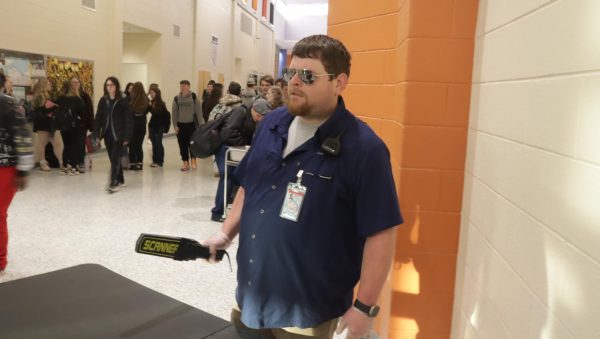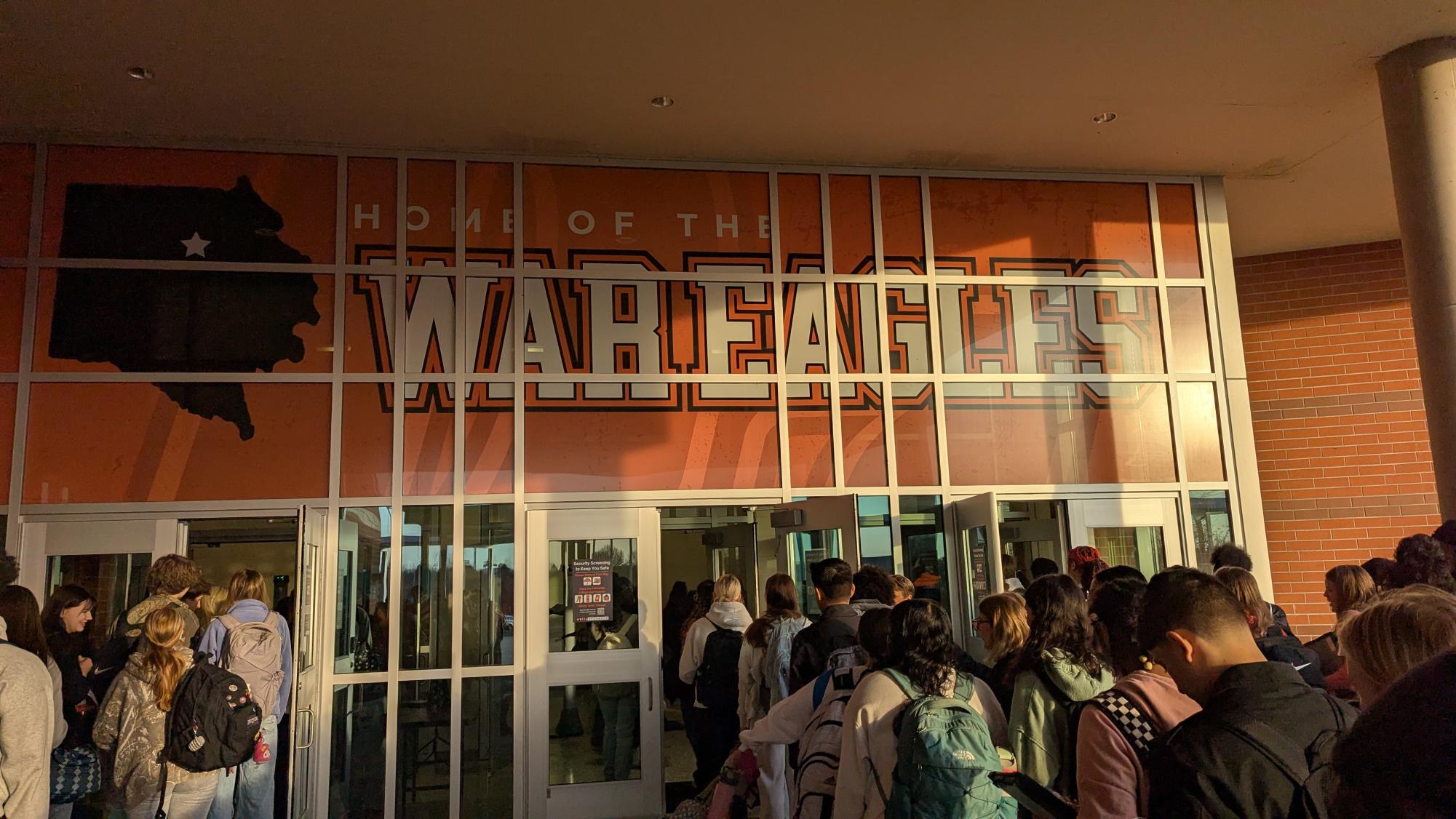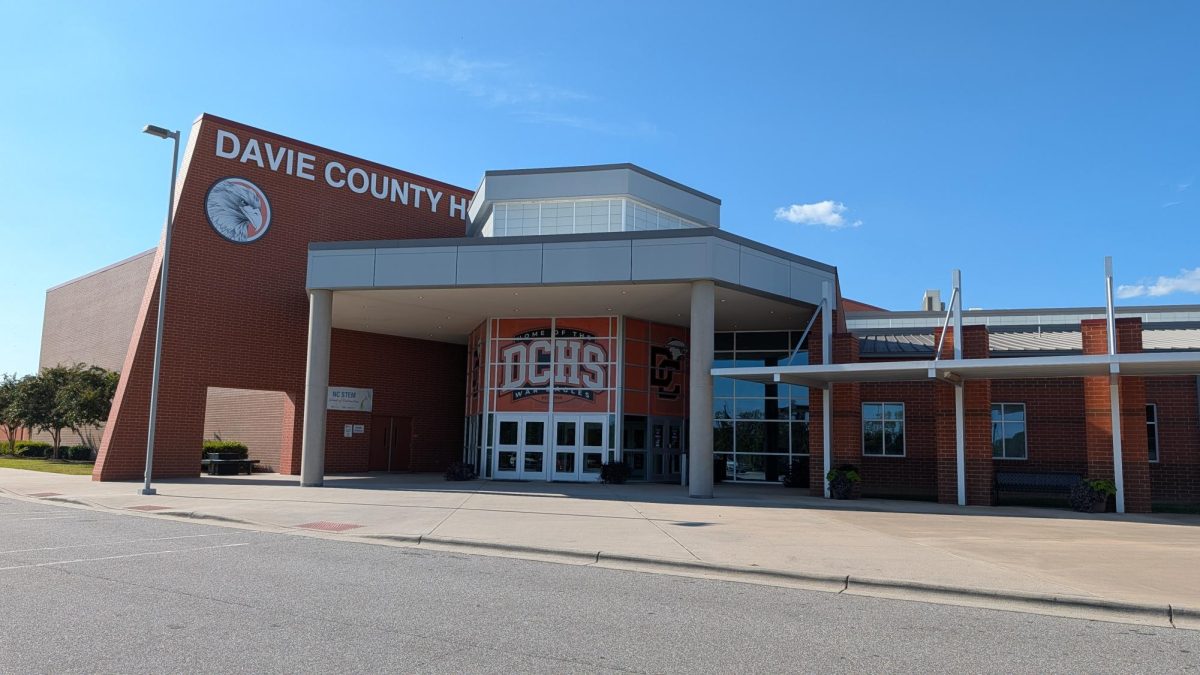Exiting the car, the chill of the Wednesday morning air is a shock. You make your way up to school, picking up the pace in hopes of escaping the cold and making your way to first period. You have a test coming up soon, but maybe you can make it to class early and cram in some extra studying time. All those hopes are quickly crushed as you walk up to a line out the door and a sea of kids digging into their backpacks for their Chromebooks. And then you remember: today is the first day of the metal detectors.
It’s finally your turn to go through the devices. You’ve pulled out your Chromebook, following the lead of those around you, handing it off to a teacher as you cross the threshold. With your Chromebook back in your hands, you see out of the corner of your eye students carrying their bags over to CTE teacher Will Miner who carries a wand and scans their bags in a secondary screening. You book it to your first-period class, still holding onto hope that you’ll make it on time.
The Open Gate Metal detectors debuted at Davie High School on Wednesday, February 5. Over winter break, the metal detectors were announced to be installed during the second semester in all middle and high schools. There has been much debate since the announcement on whether or not metal detectors are necessary among the student body and staff since a whole semester has passed without them.
When the system was first announced, there was initially some confusion about when it would be fully implemented. An email sent on January 1 stated that Davie County High School would install Open Gate on Monday, January 6, and all middle schools would install the system on January 8. However, Open Gate was installed in all middle schools before the high school, whose detectors wouldn’t be installed until nearly a month later. The schools stated that the continual postponement of the detectors was due to various reasons such as snow and exams.
For some students, the confusion continued into the debut of the detectors on campus. Those surveyed claimed they were not given clear instructions about the new devices. Sophomore Brylie Creel said that she “didn’t know what needed to be taken out before going through the metal detectors or what to honestly expect.” She and other students felt they didn’t understand what items would set off the detectors, how many detectors there would be, or the overall procedure of entering in the morning.
Information about the metal detectors, however, was communicated to students and parents before their official implementation. Davie High hosted an information night for all students and parents on January 23. Additionally, students were given another opportunity to preview the impact of the devices during all lunch periods in the week leading up to exams. The school set up a fully operational detector in the cafeteria and announced that students could go through the metal detectors and test what items would set off the alarms. Only a few took advantage of this opportunity.
Regardless of the information provided beforehand, once the metal detectors were finally installed on Wednesday, February 5, students reported that both the bus rider entrance and the car rider entrance were backed up.
“I walked in the car-rider door around 7:35 a.m.,” sophomore Lidia Marsh said. “There were people everywhere trying to get their Chromebooks.”
Tardiness was a concern for many students when the metal detectors were announced, but an email was sent out to teachers informing them that the process took up until 8:16—one minute over the late bell—and tardiness was excused for the first couple of days for students to adjust to their new morning routine.
The question at the forefront for many students is whether these long lines and adjustments to routine are worth the hassle. Some staff argue that the metal detectors are necessary and helpful in preventing school violence. If they cannot stop the violence directly, they can at least provide preventative benefits such as an early identification of a threat.
“I think the metal detectors are a really good system to have,” English teacher Kasi Pond says. “Some people look at it and say, ‘It’s not going to stop a weapon.’ Maybe it won’t stop it, but it will give us a heads up to alert teachers so we can go on lockdown faster to protect you guys sooner.”
As far as preventative measures go, the metal detectors stand as a tacit warning that violence isn’t tolerated and will be quickly identified before an attacker has ample opportunity to enact violence. Sophomore Jacob Winston sees them as “kind of like a warning” or a deterrent for others. When asked if he believes that the detectors will deter any school violence that isn’t gun-related, Winston responds that he believes it will, not just weapons but anything that could be dangerous.
Most of the staff and students who see the Open Gate system as a positive addition to the school argue that it’s a safety and proactive measure rather than an attack on the student body.
“And just understand that we’re doing it to protect y’all as soon as we can, not cause any problems or issues,” Pond says.

The lack of efficiency and consistency are commonly noted cons of the new detectors. Students have reported that the metal detectors are unpredictable with what will set them off. Sophomore Leah Gibson, among others, reports that the metal detectors are inconsistent with binders especially.
“My binders originally set off the metal detectors, so I had been taking them out since then, which was a real hassle,” Gibson said. “The other day, I went through the detectors without taking out my binders just to see what would happen, and it didn’t go off. So there’s some inconsistencies on what sets them off on any given day.”
While many students at Davie High School see why there is a need for metal detectors at the school, some are still concerned about the effectiveness of the metal detectors and their efficiency. The biggest concern overall was the potential increase in tardiness. Davie has already had a problem with tardiness and students were worried that the metal detectors would worsen the problems. But as students get into the routine the metal detector lines are sure to get better. In the last week, the line has much improved since the first day Open Gate was introduced.
Some students have more reserved opinions about the detectors. Freshmen Anna Hendrick and Junior Casswell Moore take a neutral stance on the matter. While Hedrick believes the metal detectors are “fine,” Moore’s main concern for the detectors is whether or not the school can execute the detection system in an orderly fashion.
“I’m neutral about it cause it slows down things,” Moore said. “But as long as the school can effectively get it done, I see no issue with it.”
In the eyes of students like these, the metal detectors either do not cause them any inconvenience or they simply do not care. According to Moore, the only thing that could make this an overall positive is making the process faster.
Metal detectors and other safety precautions like clear bags are becoming increasingly common around the country. The number of school shootings is not trending downward. In our neighboring school system, Forsyth County, there have been several gun-related incidents in the last four years. Going to school in the modern day is, unfortunately, a risk. There is no longer the question if a school shooting is going to happen, it’s when. Schools need to take the necessary actions to protect their students and staff. Practicing lockdown drills is not going to cut it anymore.
“I think in a modern school, set in the modern world, where you do see more violence, I think weapons detection system is unfortunately necessary,” history teacher Zach Wood said. “It’s kind of where we’ve gotten to the state of it’s more accessible for people to bring in guns and knives, and we’ve seen that in other schools. Thankfully not here at Davie as far as we know, but the precaution is there to keep us safe and to keep you all safe.”
While metal detectors are not 100% guaranteed to stop someone from bringing a weapon to school, their main purpose is to alert everyone immediately to eliminate or minimize the threat. Early identification is key to stopping any kind of potential damage. The question of necessity is answered by acknowledging the events of the world around us. The recent tragedy of Apalachee High School in Georgia gives a stark warning to school systems to not sit passively and wait but to take action to protect their students. We can hope that tragedies will never occur in our communities, but being prepared shows the value we place on our education system and the safety of our students.








